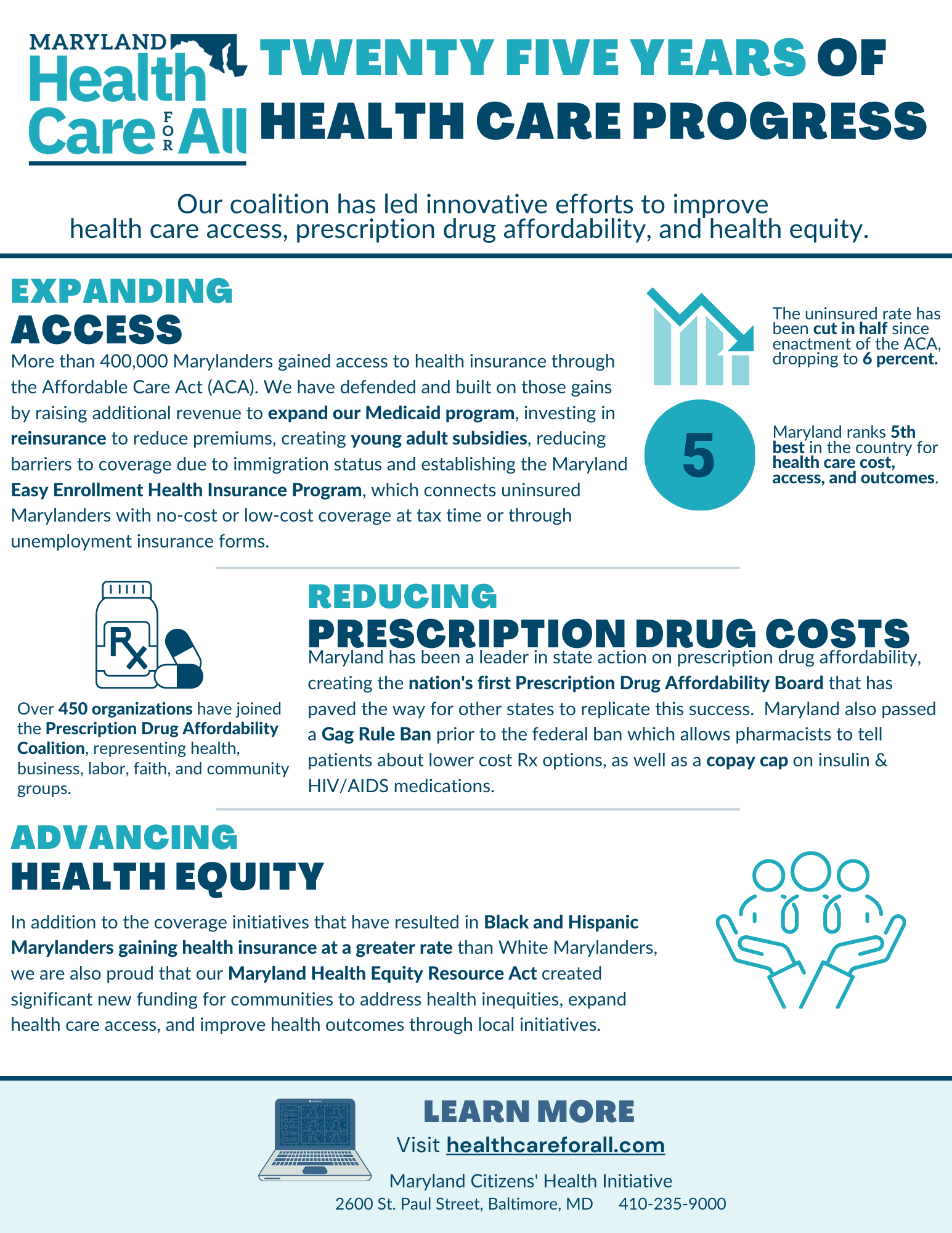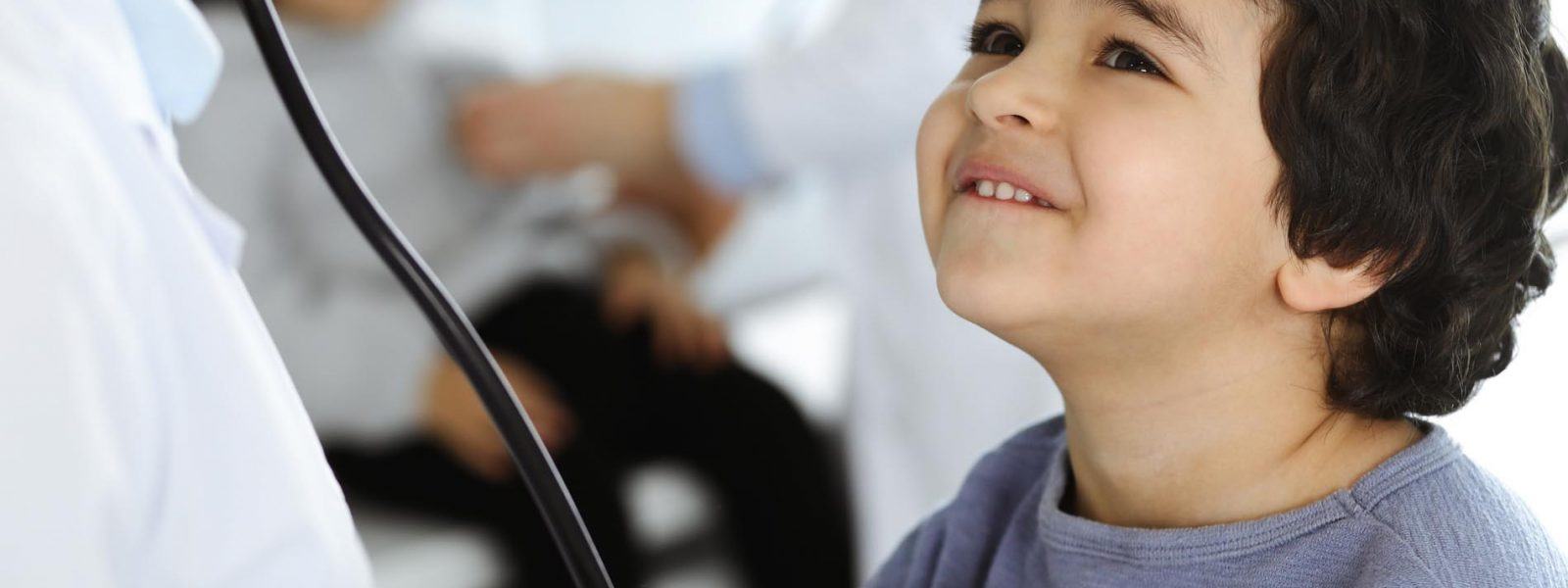
The Maryland Health Care for All! Coalition has been working to achieve quality affordable health care for all Marylanders since 1999.
During that time, the state’s uninsured rate has been cut in half and coverage gains have been greatest among Marylanders who are low-income, who identify as Black and/or who identify as Hispanic.
Below is more detailed information about some of our most recent campaigns and how they have advanced our mission of improving health care access and equity.
.
Overriding Governor Hogan’s veto, the Maryland General Assembly moved to fully fund the first-in-the nation commission to make expensive drugs more affordable for Marylanders.
The Health Equity Resource Communities Initiative was an Emergency bill to revive an intervention proven to improve health equity in Maryland. This creates $59M in new funding over the next five years for evidence-based, community-led efforts to improve health care access in disadvantaged communities.
Thanks to new state-funded health insurance subsidies, uninsured Marylanders between the ages of 18-34 can access much more affordable coverage through the Maryland Health Connection. This pilot will last 2 years and is expected to stabilize premiums for Marylanders of all ages by attracting more healthy individuals to the health insurance risk pool.
which will work to make high cost prescription drugs more affordable for Marylanders. We thank the Maryland General Assembly for passing HB 768, the Prescription Drug Affordability Board legislation, in the 2019 General Assembly Session.
In 2019 we helped pass legislation to create the Maryland Easy Enrollment Health Insurance Program. Here’s how it will work: at tax time, Marylanders will be asked if they had quality health coverage in the past year. If they answer no, they will be assisted in getting health coverage. They get the care they need while we shrink uncompensated care, holding down insurance costs for everyone. Thousands of Marylanders gained coverage through the program in the first year alone. This successful program was expanded in 2021 to add a similar check box for coverage on the state’s unemployment forms.
In 2018 Maryland became the eleventh state in the nation to ban the so-called “gag rule” by which some Pharmaceutical Benefit Managers prohibit pharmacists from telling consumers about the least expensive way to purchase their drugs.
In 2018 we helped pass legislation to 1) create a reinsurance program to stabilize premiums on the individual market, 2) provide protections against proposed federal rules to expand substandard limited-duration plans and association health plans, and 3) compel the Health Insurance Coverage Protection Commission to study and report on creating a statewide individual mandate to replace the federal mandate that will no longer be effective starting in 2020 as well as the Basic Health Plan.
The landmark Maryland Health Benefit Exchange Law of 2012 and Maryland Health Progress Act of 2013 places Maryland at the forefront of states implementing the federal Affordable Care Act in a way that will make health care more affordable for all of us. For more background, check out the Maryland Health Benefit Exchange website.
The Maryland General Assembly’s decision to increase the tax on little cigars to 70 percent of the wholesale price and double the tax on smokeless (chew or spit) tobacco, has saved thousands of young lives from addiction to these deadly products. This public health victory builds on the great success Maryland has had over the past decade in reducing teen smoking of cigarettes. Learn more about the success of this initiative in The Abell Report.
Governor Martin O’Malley allocated revenue from our life-saving 2011 alcohol sales tax increase for the health care and public health needs originally proposed by the Lorraine Sheehan Alcohol Tax Coalition. The money will go to funding health care coverage for lower income adults; programs for people with developmental disabilities and mental health issues; drug and alcohol treatment and prevention; home and community-based care; and health care worker training. Our Executive and Legislative leadership have demonstrated that they believe a promise made is a promise kept. The alcohol tax increase will also save lives and reduce health care costs by reducing underage drinking and alcohol abuse. Learn more about the success of this initiative in The Abell Report.
Under the leadership of Governor Martin O’Malley, Lt. Governor Anthony Brown, and the Maryland General Assembly, Maryland has gone from 44th to 14th in the nation in providing health care coverage to low-income adults and has expanded health care coverage to over 250,000 parents, children, and seniors. The Governor’s Working Families and Small Business Health Coverage Act of 2007 provided health care coverage to over 200,000 uninsured Maryland parents and caregivers, many of whom would have otherwise had to use hospital emergency rooms for their health care needs. This in turn would increase what we all pay in higher premiums for uncompensated hospital care.
was made possible by a one-dollar per pack increase in the state cigarette tax. This reduced the number of packs of cigarettes sold in Maryland by 74 million (and thereby saving thousands of lives from the horrors of tobacco caused illness and death and giving Maryland the 6th lowest smoking rate in the country) and raised an additional $144 million per year. This revenue is almost identical to the state’s cost for the health care expansion. Between 1998 to 2009, Marylanders who smoke decreased by 32%; double the national average of 16%.
The Governor’s Working Families and Small Business Health Coverage Act of 2007 also provided substantial grants to over 200 Maryland small businesses that had previously been unable to provide health care for their employees. To find out if your business can participate, visit the Maryland Health Insurance Partnership website. **Update: Small businesses that qualify can claim tax credits AND these grants to help offset the cost of providing coverage to their employees. Talk with a certified consumer assistance representative with the Maryland Health Connection today!**
The O’Malley/Brown Administration has worked with the General Assembly and health care advocacy groups to locate and enroll over 85,000 children who are eligible for state health care coverage. New effective outreach and enrollment strategies include the Kids First Act, the Foster Kids Act, as well as reaching out to Medicaid eligible children in Baltimore City through the school lunch program – all of these inventive laws have aided in the exceptional enrollment of Maryland’s children. The Administration has also worked to make sure that these children have proper dental care to avoid another tragedy like the death of young Deamonte Driver. The Governor and General Assembly enacted legislation that increased the age limit from 18 to 25 for young people to stay on their parents’ health care plans. This allows thousands of Maryland’s young adults to keep health care coverage while they are students or look for jobs that offer health insurance.



